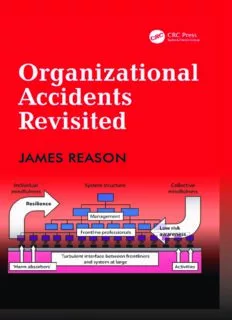
Organizational accidents revisited PDF
Preview Organizational accidents revisited
OrganizatiOnal accidents revisited To Thomas Augustus Reason (1879–1958). My grandfather to whom I owe much more than my existence. Organizational Accidents Revisited JAmes ReAsOn Professor Emeritus, University of Manchester, UK CRC Press Taylor & Francis Group 6000 Broken Sound Parkway NW, Suite 300 Boca Raton, FL 33487-2742 © 2016 by James Reason CRC Press is an imprint of Taylor & Francis Group, an Informa business No claim to original U.S. Government works Printed on acid-free paper Version Date: 20160223 International Standard Book Number-13: 978-1-4724-4765-4 (Hardback) This book contains information obtained from authentic and highly regarded sources. Reasonable efforts have been made to publish reliable data and information, but the author and publisher cannot assume responsibility for the valid- ity of all materials or the consequences of their use. The authors and publishers have attempted to trace the copyright holders of all material reproduced in this publication and apologize to copyright holders if permission to publish in this form has not been obtained. If any copyright material has not been acknowledged please write and let us know so we may rectify in any future reprint. Except as permitted under U.S. Copyright Law, no part of this book may be reprinted, reproduced, transmitted, or utilized in any form by any electronic, mechanical, or other means, now known or hereafter invented, including pho- tocopying, microfilming, and recording, or in any information storage or retrieval system, without written permission from the publishers. For permission to photocopy or use material electronically from this work, please access www.copyright.com (http:// www.copyright.com/) or contact the Copyright Clearance Center, Inc. (CCC), 222 Rosewood Drive, Danvers, MA 01923, 978-750-8400. CCC is a not-for-profit organization that provides licenses and registration for a variety of users. For organizations that have been granted a photocopy license by the CCC, a separate system of payment has been arranged. Trademark Notice: Product or corporate names may be trademarks or registered trademarks, and are used only for identification and explanation without intent to infringe. Visit the Taylor & Francis Web site at http://www.taylorandfrancis.com and the CRC Press Web site at http://www.crcpress.com Contents List of Figures and Tables vii About the Author ix Chapter 1 Introduction 1 ParT 1 refreshers Chapter 2 The ‘Anatomy’ of an Organizational Accident 9 Chapter 3 Error-Enforcing Conditions 13 ParT 2 aDDiTions sinCe 1997 Chapter 4 Safety Management Systems 23 Chapter 5 Resident Pathogens 27 Chapter 6 Ten Case Studies of Organizational Accidents 41 Chapter 7 Foresight Training 87 Chapter 8 Alternative Views 99 Chapter 9 Retrospect and Prospect 111 Chapter 10 Taking Stock 123 Chapter 11 Heroic Recoveries 131 Index 137 Page Intentionally Left Blank List of figures and Tables figures 1.1 The ‘Swiss cheese’ model of accident causation 2 2.1 summarizing the stages involved in an organizational accident 10 7.1 The three-bucket model for assessing risky situations 90 7.2 How the buckets might be ‘read’ by junior staff working alone 91 7.3 Balancing the person and the system 92 9.1 The cyclical progression of stages 115 9.2 Reduction in variability on each successive cycle 120 Tables 3.1 The principal sources of latent conditions related to specific case studies 13 3.2 Error-enforcing conditions and their relative effects 18 3.3 Error-producing situations 18 6.1 summarizing the active failures and latent conditions that undermined or breached the aircraft maintenance system’s defences 58 Page Intentionally Left Blank about the author James Reason is Professor emeritus of Psychology at the University of manchester, england. He is consultant to numerous organizations throughout the world, sought after as a keynote speaker at international conferences and author of several renowned books including Human Error (CUP, 1990), Managing the Risks of Organizational Accidents (Ashgate, 1997), The Human Contribution (Ashgate, 2008) and A Life in Error (Ashgate, 2013).
Description: